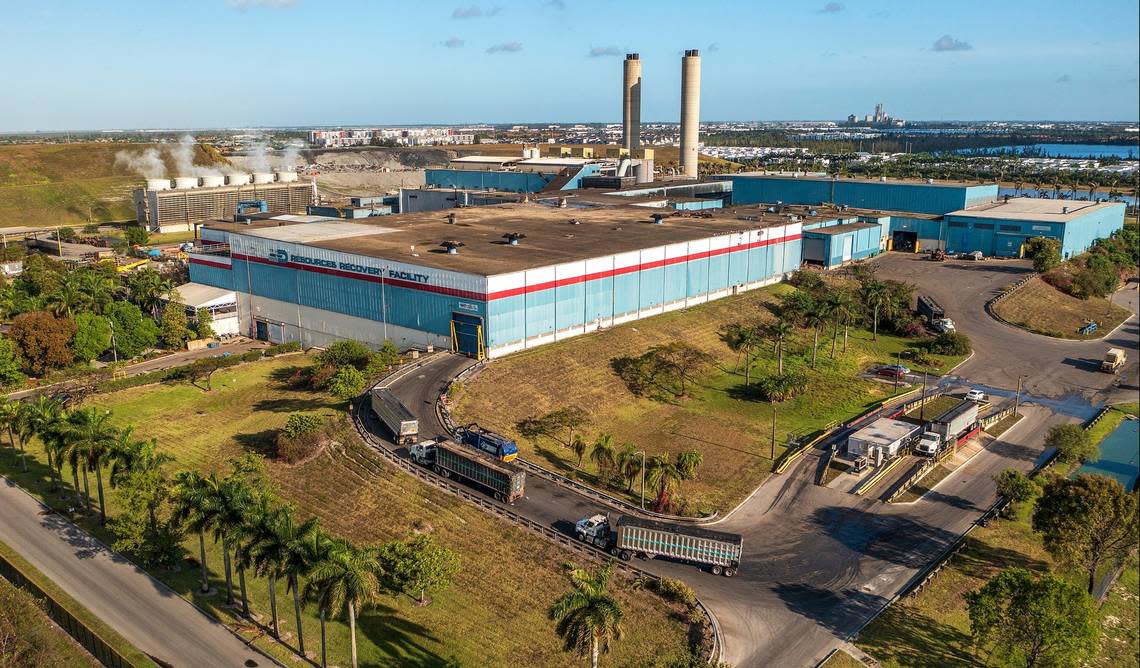Miami-Dade’s main garbage plant caught fire. What does that mean for trash day?
The incinerator plant that caught fire on Sunday processes about half of the garbage Miami-Dade County collects on a typical week, meaning Trash Day could be getting more complicated this week.
As a fire at the Doral facility continued to burn Monday morning, Miami-Dade was diverting trash-hauling trucks to landfills and dumping stations in a system that handles nearly 5,000 tons of waste per day from more than 300,000 homes.
READ MORE: Miami-Dade has millions of tons of trash and is running out of places to put it
People familiar with the county’s garbage operations said they didn’t expect significant disruptions on the county’s neighborhood trash routes.
“We’ll be able to pick it up,” said Joe Hernandez, president of the AFSCME Local 3292, the union representing the county’s Solid Waste employees. “But moving it is going to be a bit of a strain for us.”
In a statement, the county’s director of Solid Waste, Michael Fernandez, said residential customers could expect some disruption in the normal trash pickup schedules but to continue putting their bins out as normal.
“Waste collection customers may experience service delays in the coming days. Customers are kindly asked to continue placing their green waste carts at the curb by 7 a.m. on their service days to ensure their carts are serviced,” he said. “Routes will continue to be serviced until they are completed; however, it may take longer than usual for routes to be fully serviced. Miami-Dade’s main priority is the safety of our residents and staff.”
Along with all homes outside city limits, Miami-Dade’s Solid Waste Department handles garbage pickups for 10 municipalities: Aventura, Cutler Bay, Doral, Miami Gardens, Miami Lakes, Opa-locka, Palmetto Bay, Pinecrest, Sunny Isles Beach and Sweetwater.
READ MORE: ‘Long-term fire’: Blaze at Miami-Dade waste-to-energy plant burning for a second day
The plant is run by Covanta under a county contract, and is a vital part of how Miami-Dade disposes of trash from households. At a press conference, Fernandez said the facility has been processing more than 50% of the trash that comes into county facilities.
Even so, he said the county’s landfills can handle the short-term diversion of garbage trucks from the Convanta facility. He said customers shouldn’t notice changes beyond trucks possibly arriving a few hours later on their regular routes. “Customers really shouldn’t see any impact at all,” he said.
William Meredith, the Covanta executive overseeing the Doral plant, said it’s too soon to predict when the facility could begin accepting trash deliveries again.
“We have to get in the building first,” he said at the press conference in Miami-Dade’s Emergency Operations Center, about two miles from the plant. “We have to wait for the Fire Department to let us in.”

The county created a web page, miamidade.gov/wastefire, with updates on Solid Waste services impacted by the fire.
Miami-Dade’s recycling trucks don’t use the Covanta plant, which burns garage and uses steam from the fire to produce energy. So there’s no impact expected for recycling pickups across Miami-Dade.
There’s a privately run landfill in Medley, near the Doral incinerator, and two county landfills on the northern and southern ends of Miami-Dade. Trucks normally bound for the Covanta plant must go to those spots when the plant shuts down for maintenance, so brief interruptions of the incinerator aren’t unusual, Hernandez said.
But with the county’s Fire Rescue Department not predicting when it can end the blaze, Miami-Dade could be facing a long-term loss of its No. 1 trash destination.
“Unfortunately, it takes up landfill space we sorely need,” Hernandez said.
This article was updated to reflect more recent information provided by Miami-Dade County at an afternoon press conference.
